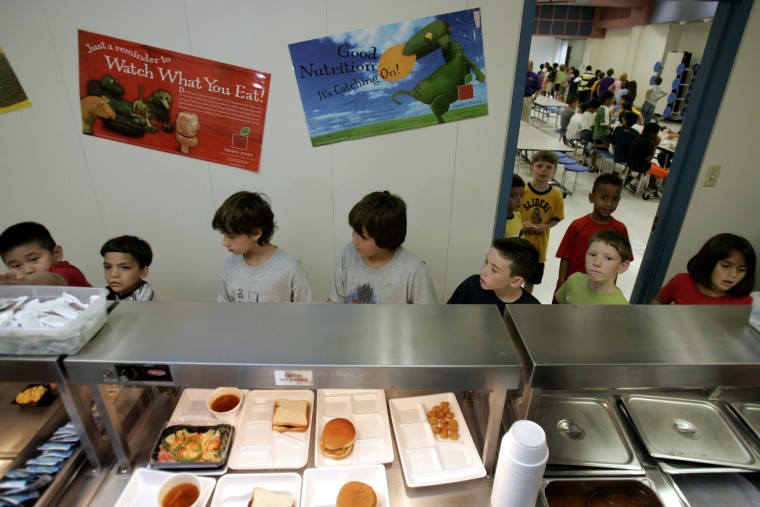When it comes to providing resources to feed low-income children, congressional Republicans have made some provocative moves in recent months. Not only have GOP lawmakers fought to slash food stamps, but Rep. Jack Kingston (R-Ga.)
suggested struggling children should either pay more for food at public schools or tackle janitorial tasks in their schools.
House Budget Committee Chairman Paul Ryan (R-Wis.) followed soon after with a speech suggesting kids who rely on school lunches
aren't loved as much as kids who bring their own lunch to school. The far-right lawmakers was relying on an anecdote that turned out to be
made-up.
But the awkward GOP relationship with school lunches took another turn this week, when House Republicans unveiled agriculture legislation with provisions that surprised Democrats. The
Politico report, which garnered a "
WTF?" headline from Josh Marshall, explained:
[T]he bill language specifies that only rural areas are to benefit in the future from funding requested by the administration this year to continue a modest summer demonstration program to help children from low-income households -- both urban and rural -- during those months when school meals are not available. Since 2010, the program has operated from an initial appropriation of $85 million, and the goal has been to test alternative approaches to distribute aid when schools are not in session. The White House asked for an additional $30 million to continue the effort, but the House bill provides $27 million for what's described as an entirely new pilot program focused on rural areas only.
The piece added that Republicans "had some trouble explaining" the merit of the plan, and as one might imagine, Democrats representing urban communities, were not pleased.
But what's the possible justification for Republicans limiting their concern for child hunger to rural areas? Why replace a White House proposal to tackle child hunger nationwide with a smaller plan that excludes children in urban communities?
[House Appropriations Committee spokesperson Jennifer Hing pointed out] that children in urban areas wouldn't exactly be left out in the cold by the law. Each year, the federal government spends hundreds of millions of dollars on the Summer Food Service Program, which provides meals to low-income children when school is not in session and they don't have access to free or reduced school lunch. In 2012, for example, the government allocated $402 million to the program, and the White House has requested $493 million for 2015, according to the Food Research and Action Center. The $27 million set aside in the proposed agriculture appropriations bill would go towards developing methods of providing access to those meals in rural areas. "We received a report from USDA on the difficulties that rural areas face with summer feeding programs," said Hing. Rural, isolated parts of the country can develop high rates of food insecurity due to the lack of transportation infrastructure or other amenities which reduce hunger. The county with the highest food insecurity rate in the nation and the county with the highest food insecurity rate are both heavily rural. They are also both disproportionately non-white.
Resnikoff's report added that there's evidence that a narrow majority of counties with high food insecurity are predominantly rural, but according to the USDA, in absolute numbers, "cities tend to house more food insecure households."
Taken together, GOP lawmakers may have a half-way plausible explanation for their proposal: they're creating a pilot program in response to a USDA report, and while this program won't benefit urban areas, there will be other resources available for low-income kids in cities.
But the rural-only approach clearly has left some Democrats with a bad taste in their mouths.
"Excluding children from urban areas jeopardizes the effectiveness of the demonstration program and is also mean-spirited. Hunger isn't bound by per capita population data, and children in urban areas shouldn't be penalized because of where they live," House Appropriations Ranking Member Nita Lowey (D-NY)
said.
And even putting aside the geographic and racial elements of the dispute, Sahil Kapur
added that the spending levels being discussed are arguably too low, independent of the rural/urban argument.
"Kids are already under-served by the summer school program," said Crystal FitzSimons, director of school programs at the nonprofit Food Research and Action Center. "Rural communities really do struggle with the summer lunch program. But there are not enough food programs for low-income children in rural and urban areas, which is a huge problem. We need to invest more in these programs for kids."
